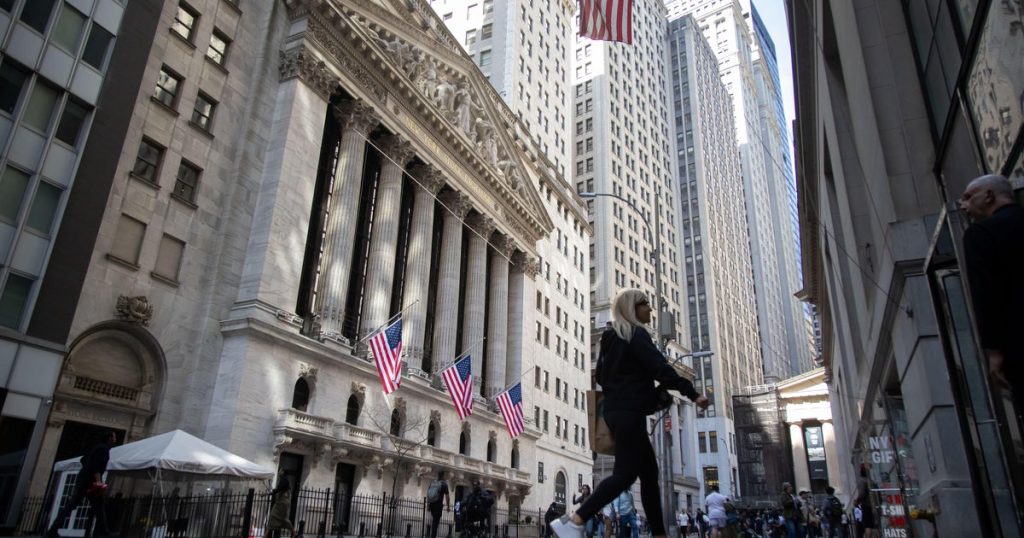The recent two-day surge in the stock market met a notable slowdown as conflicting news surrounding US-China trade negotiations dampened investor enthusiasm. Key indices such as the Dow Jones and S&P 500 showed signs of decline before trading commenced, while the tech-heavy Nasdaq Composite managed to hold on to an upward momentum. Market analysts suggest that uncertainty over tariffs and trade discussions is influencing the current market fluctuations.
| Article Subheadings |
|---|
| 1) Diverging Market Trends Amid Trade Talks |
| 2) Investor Reaction to Tariff Negotiations |
| 3) Government Statements Impacting Market Sentiment |
| 4) International Market Response to U.S. Developments |
| 5) Future Outlook for U.S.-China Trade Relations |
Diverging Market Trends Amid Trade Talks
As trading on Wall Street began on Thursday, both Dow Jones Industrial Average futures and S&P 500 futures experienced declines, with decreases of 194 points or 0.5% and 10 points or 0.2%, respectively. This marked a shift from a recent recovery, signaling a more cautious approach among investors after two days of gains driven by optimism surrounding a potential trade agreement with China. Notably, the Nasdaq Composite futures rose by 2.5%, showcasing a divergence among major market indices.
The mixed performance highlights investor anxiety as they navigate uncertain economic conditions and the ongoing tariffs that the U.S. has imposed on Chinese goods. The volatility in the stock market underscores concerns about various factors impacting trade talks and the broader economic landscape.
Investor Reaction to Tariff Negotiations
The latest development in U.S.-China trade negotiations comes as both sides express conflicting narratives. On Wednesday, U.S. Treasury Secretary Scott Bessent spoke at the Institute of International Finance in Washington, D.C., highlighting an opportunity for a substantial trade agreement. This assertion, however, was met with skepticism in the investment community as evidence of any tangible progress remained elusive.
Many investors have shown caution following reports indicating that China may backtrack on potential promises. Market analysts note that announcements around tariff exemptions for automobiles yielded a tepid reaction from investors, reflecting a broader reluctance to engage in further speculative trading until more concrete developments arise.
Government Statements Impacting Market Sentiment
Amid rising tensions, communications from officials play a critical role in shaping market sentiment. President Trump commented on the trade situation, asserting that “everything’s active” and suggesting ongoing discussions with China, which have been met with skepticism. The Chinese government, through a spokesperson, vehemently denied claims regarding progress in negotiations, indicating that reports of advancements were unfounded.
The conflicting statements contribute to an air of uncertainty within the markets, leading some investors to adopt a more defensive posture while awaiting clear cues regarding tariff changes. Such discrepancies may further complicate the path to a resolution, leaving market participants anxious about their investment strategies amid fluctuating global market dynamics.
International Market Response to U.S. Developments
The repercussions of U.S. trade negotiations are not limited to American markets alone; global stock markets are also feeling the impact. Reports indicate significant declines in Asian markets on the previous Wednesday, accompanied by a softer opening across European exchanges. The interconnected nature of the global economy means that tariffs and trade relations not only influence domestic stock performance but can also shift international market behavior.
Analysts from firms like Capital Economics have indicated that optimism fueled by possible tariff reductions has been a major driver of positive equity market performance in recent days. However, uncertainties concerning the efficacy of the negotiations are causing nervousness among investors, as demonstrated by the downturn in various markets worldwide.
Future Outlook for U.S.-China Trade Relations
The future of U.S.-China trade relations remains precarious as both countries grapple with their economic strategies. Experts warn that any miscommunication or misunderstanding could further exacerbate tensions. The recent mixed signals emphasize the delicate balancing act facing both governments, as they attempt to reach mutually beneficial agreements amid rising global scrutiny and domestic political pressures.
Investor sentiment will likely continue to revolve around news releases regarding tariff adjustments and trade discussions. Should significant concessions be made on either side, one could anticipate a renewed rally in stock indices. Alternatively, continued stalemate or lackluster negotiations could foster ongoing volatility and uncertainty in the markets, prompting investors to remain vigilant as developments unfold.
| No. | Key Points |
|---|---|
| 1 | The stock market saw mixed signals due to recent developments in U.S.-China trade negotiations. |
| 2 | Futures for key indices dropped before market opening, indicating bearish sentiment among investors. |
| 3 | Conflicting statements from U.S. officials and China contribute to investor uncertainty regarding trade deals. |
| 4 | International markets are also affected by U.S. trade discussions, reflecting a global interconnectedness. |
| 5 | The outlook for U.S.-China relations remains uncertain, influencing market volatility moving forward. |
Summary
In conclusion, the stock market’s recent performance vividly illustrates the intricate relationship between investor sentiment and international trade negotiations. The ongoing discussions between the U.S. and China carry significant weight for economic stakeholders, and the fluctuations currently witnessed in the capital markets reflect broader uncertainties about future policy directions. The careful monitoring of developments in U.S.-China relations will be essential for investors as they navigate this volatile environment.
Frequently Asked Questions
Question: How do trade negotiations impact the stock market?
Trade negotiations significantly influence the stock market as they can determine tariff rates, affecting corporate profits, investor confidence, and economic growth prospects.
Question: What were the main factors causing recent market volatility?
Recent volatility was largely driven by mixed signals regarding U.S.-China trade talks, particularly conflicting statements from officials about the potential for tariff changes and market sentiment reflecting uncertainty.
Question: Why do international markets respond to U.S. developments?
International markets respond to U.S. developments due to the global interconnectedness of economies, where trade policies and economic performance in the U.S. have repercussions for other nations and their markets.


